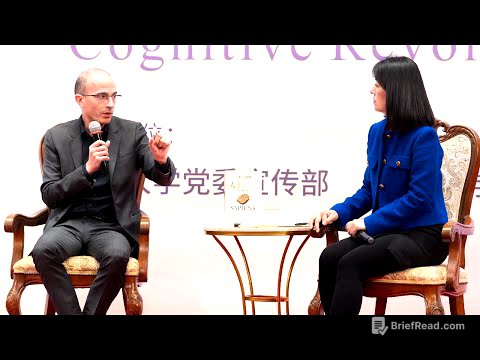TLDR;
Neil deGrasse Tyson interviews Brian Cox, a renowned physicist and science communicator, about the frontiers of particle physics, the importance of skepticism, and the search for life in the universe. They discuss the Large Hadron Collider (LHC) at CERN, the discovery of the Higgs boson, and the ongoing search for new particles. They also explore the mysteries of dark matter and dark energy, the role of string theory, and the latest discoveries about black holes. Finally, they delve into the search for life beyond Earth, focusing on Europa, Mars, and Enceladus.
- The LHC is a powerful tool for exploring the fundamental building blocks of matter and creating new particles.
- The discovery of the Higgs boson was a major triumph for particle physics, but there are still many mysteries to unravel.
- The search for life beyond Earth is a major focus of modern astronomy, with Europa, Mars, and Enceladus being prime candidates for habitable worlds.
Introduction: Brian Cox [0:00]
Neil deGrasse Tyson introduces Brian Cox, a British physicist and science communicator, as his guest on StarTalk. They discuss Cox's background in particle physics, his work at CERN, and his experience as a musician. Cox shares his journey from a rock musician to a renowned physicist, highlighting his passion for science and his commitment to public engagement.
Rockstar Physicist [4:10]
Cox recounts his early career as a musician, including his time in a band that signed a record deal with A&M Records and toured with Jimmy Page. He then returned to Manchester to pursue a physics degree, eventually becoming a professor of particle physics at the University of Manchester. Cox emphasizes the importance of public engagement in science, arguing that it is a scientist's duty to share their knowledge and understanding with the public.
Being a Skeptic [7:28]
Tyson and Cox discuss the importance of skepticism in science. They agree that scientists must be skeptical of claims that contradict established scientific principles and that it is crucial to challenge extraordinary claims with rigorous evidence. Cox shares his experience with confronting pseudoscience and the importance of promoting critical thinking.
The Frontier of Particle Physics [14:02]
Tyson and Cox delve into the current state of particle physics, focusing on the LHC at CERN. They explain how the LHC collides protons at high energies, breaking them apart and creating new particles. Cox describes the process as a "microscope" that allows scientists to probe the fundamental structure of matter. He emphasizes that the LHC is a powerful tool for discovering new particles and testing theories about the universe.
Making Higgs Particles [18:54]
Cox explains how the LHC is used to create Higgs bosons, which are responsible for giving mass to other particles. He describes the process of colliding protons at high energies, creating enough energy to produce Higgs bosons, which then decay into lighter particles. Cox highlights the challenges of detecting these decay products and the importance of statistical analysis in particle physics.
Pursuing Elegance [22:34]
Tyson and Cox discuss the role of elegance and simplicity in scientific theories. They acknowledge that while beauty and elegance can be guiding principles, they must be tempered with empirical evidence. Cox uses the example of Kepler's early attempts to explain planetary motion, which were based on aesthetic principles but ultimately proved incorrect. He emphasizes the importance of testing theories rigorously against observations.
How Do We Find New Particles? [25:06]
Tyson and Cox discuss the challenges of discovering new particles at the LHC. They explain that the LHC is currently operating at its maximum energy level and that further increases in energy would require significant upgrades. They discuss the concept of "high luminosity" upgrades, which involve increasing the number of proton collisions to improve the chances of detecting rare events.
Progress in String Theory [29:30]
Tyson and Cox discuss the current state of string theory, a theoretical framework that attempts to unify all the fundamental forces of nature. They acknowledge that string theory has become more complex over time and that the initial hope of finding a "theory of everything" has faded. However, they highlight recent progress in string theory, particularly its potential connection to dark matter and dark energy.
Giant Black Hole Jets [41:30]
Tyson and Cox discuss the recent discovery of a massive jet emanating from a black hole. They emphasize that while this discovery is exciting, it is just one piece of the puzzle in understanding black holes. They discuss the importance of observing black holes in multiple wavelengths, including radio waves and gravitational waves, to gain a more complete understanding of their behavior.
Celebrating the Universe [47:08]
Tyson and Cox discuss Cox's public engagement work, including his "Horizons" tour, which combines science with music and philosophy. Cox explains his goal of inspiring audiences to contemplate the universe and their place within it. He emphasizes the importance of using multiple perspectives, including science, art, and philosophy, to explore the big questions about life and the universe.
Life on Europa [52:00]
Tyson and Cox discuss the search for life beyond Earth, focusing on Europa, a moon of Jupiter. They highlight the evidence for a saltwater ocean beneath Europa's icy surface and the potential for hydrothermal vents on the ocean floor. Cox emphasizes the importance of the Europa Clipper mission, which is currently on its way to Europa to study its atmosphere and surface.
Neutrinos [1:02:22]
Tyson and Cox discuss neutrinos, elusive particles that interact very weakly with matter. They discuss the importance of neutrinos in understanding the fundamental forces of nature and the ongoing search for new types of neutrinos. Cox highlights the challenges of detecting neutrinos and the potential for new discoveries in this area.
Closing [1:12:26]
Tyson and Cox conclude their conversation, reflecting on the excitement and challenges of exploring the universe. They emphasize the importance of continued scientific inquiry and the need for public engagement in science. Cox expresses his enthusiasm for his upcoming tour and his commitment to sharing his passion for science with the world.









